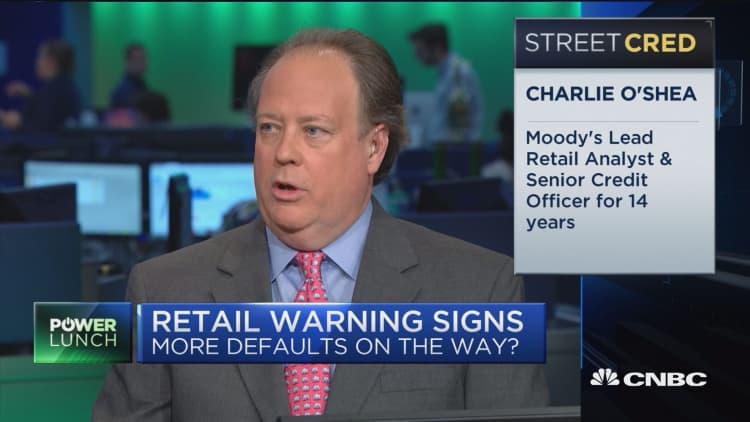
There appears to be more trouble brewing in the world of retail.
The number of distressed retailers will likely grow larger over the next year to 18 months amid a secular shift in the industry, with more defaults expected in the months ahead, a new report from Moody's has found.
"Retail is over-stored now," the financial services firm's lead retail analyst, Charlie O'Shea, told CNBC's "Power Lunch" on Friday.
"As you look at the real estate base, it's an asset. But you have to get [stores] to be flexible enough to use in an online business [capacity]."
In February, among Moody's rated retail and apparel issuers, 19 retailers had ratings of 'Caa' or lower — implying a heavily distressed company.
That number has now grown to 22 companies, or approximately 15 percent of the firm's retail and apparel category, Moody's reported this week.
This is a reoccurring theme in retail, O'Shea told CNBC. "Liquidity issues on top of competitive pressures make a tough situation for everyone."
Among those 22 distressed names are Gymboree, Sears, Nine West, Claire's Store, David's Bridal and Charming Charlie, the firm found. "These are many bellwether retailers dropping into 'Caa' territory."
Issuers on the firm's prior February report but not on Moody's latest report include Rue21 and Payless Shoesource, both of which have filed for bankruptcy and had their ratings withdrawn.
Still, analysts continue to suggest the overall retail industry maintains sound fundamentals, O'Shea said. There are select groups — department stores and specialty retailers — mainly dragging their peers down.
Best Buy,
O'Shea suggests keeping an eye on those 22 names to track which company might file for bankruptcy sooner rather than later. And there's a load of retail debt coming due in 2018. "Many retailers don't have the flexibility to do what they need to do."


